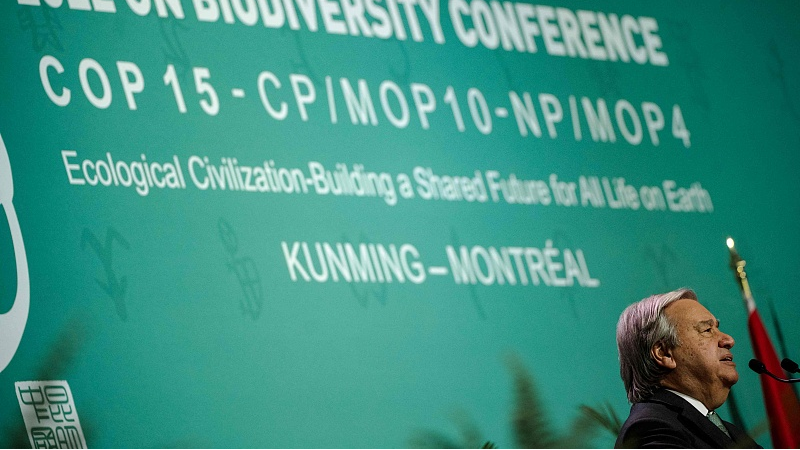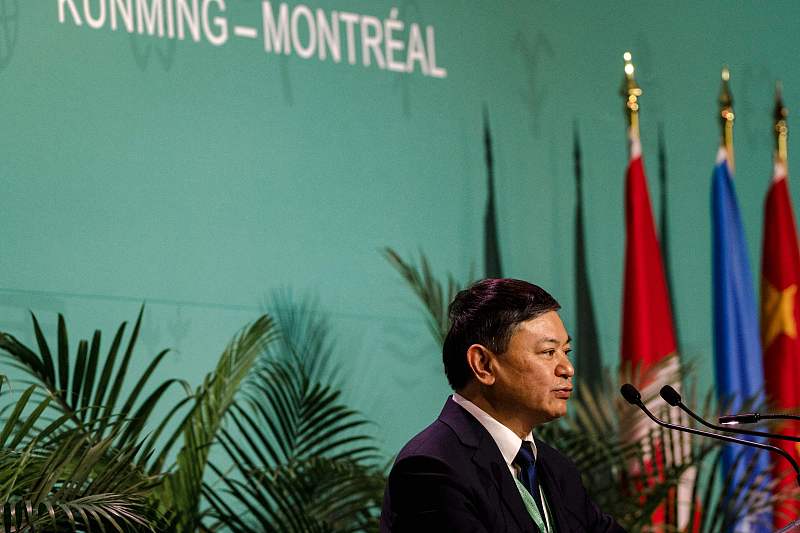
United Nations Secretary General Antonio Guterres speaks during the opening ceremony of the United Nations COP15 at Plenary Hall of the Palais des congres de Montreal in Montreal, Quebec, Canada, December 6, 2022. /CFP
United Nations Secretary General Antonio Guterres speaks during the opening ceremony of the United Nations COP15 at Plenary Hall of the Palais des congres de Montreal in Montreal, Quebec, Canada, December 6, 2022. /CFP
Editor's note: Adriel Kasonta is a London-based foreign affairs analyst and commentator. He is the founder of AK Consultancy and former chairman of the International Affairs Committee at Bow Group, the oldest conservative think tank in the UK. The article reflects the author's opinions and not necessarily the views of CGTN.
After a decision to move the second phase of the major UN gathering concerning the future of the natural habitat of our planet from China to Canada was made last year, the 15th Conference of the Parties to the Convention on Biological Diversity (COP15) has finally kicked off in Montreal.
The COP15 is taking place from December 7 to 19. It brings together representatives from around 200 countries that ratified the UN Convention on Biological Diversity (CBD) in 1992 and many thematic experts, scientists and non-governmental organizations.
Although the venue has changed, China continues to preside over the summit. The first part took place in Kunming in October 2021 in a predominantly online format and resulted in adapting the non-binding Kunming Declaration. Building on the document's political guidance and continuing under the "Ecological Civilization: Building a Shared Future for All Life on Earth" theme, the second part of the summit aims at implementing the post-2020 Global Biodiversity Framework, which sole purpose is to turn the tide on biodiversity loss by, ideally, 2030.
Since biodiversity loss is considered one of the planet's biggest threats by the World Economic Forum's Global Risks Report 2022, knowing the facts about its current condition should be very concerning to all of us, as it affects every aspect of our lives.
Notably, according to the World Wildlife Fund's (WWF) Living Planet Report, published this year, global wildlife populations have declined by an average of 69 percent since 1970. The document suggests that it directly results from the human species' activity associated with the Industrial Revolution.
The fact that COP15 is the first high-profile environmental conference hosted by China is not coincidental. It is a direct result of the acknowledgement of Beijing's outstanding progress in protecting biodiversity at home, which stems from Chinese President Xi Jinping's commitment to ecological civilization building that has become the framework for the country's approaches to sustainability and conservation written into its constitution. In other words, to quote Huang Runqiu, China's minister of ecology and environment, the Chinese government "elevated biodiversity conservation to a national strategy."

Minister of Ecology and Environment of China, Huang Runqiu, speaks during the opening ceremony of the United Nations COP15 at Plenary Hall of the Palais des congres de Montreal in Montreal, Quebec, Canada, December 6, 2022. /CFP
Minister of Ecology and Environment of China, Huang Runqiu, speaks during the opening ceremony of the United Nations COP15 at Plenary Hall of the Palais des congres de Montreal in Montreal, Quebec, Canada, December 6, 2022. /CFP
To put it into perspective, China has successfully established more than 2,759 protected areas. As President Xi announced last year, this is further related to the process of being augmented with a network of five national parks covering 227,000 kilometers that proudly constitute the most extensive such system in the world.
Moreover, the country is on track to have the most forests in the world, with an impressive achievement of reforesting 334 million hectares of bare or cultivated land between 2012 and 2017.
But one thing is to achieve quite impressive national success and the other to replicate it at the contested international level. When it comes to the latter, China will have to tread a thin line between different countries' tradeoffs in some areas of the framework against concessions in others, as well as simultaneously manage questions concerning its massive infrastructural project, which is known as Belt and Road Initiative.
Some may challenge its impact on the environment; but China has already aimed to promote the green development of the Belt and Road, strengthening international cooperation on clean energy as China encourages solar and wind power companies to "go global." China's solid green development contributes to improving global climate governance and ecological development.
A stark warning comes from the past when in 2002, signatories to the CBD already committed themselves "to achieve by 2010 a significant reduction of the current rate of biodiversity loss," and they failed. Eight years later, the same group met in Japan to agree on a new plan that included the 20 Aichi Targets, but all of them were missed, and none had been fully achieved by the 2020 deadline.
As we can see, presiding over such a big event is not plain sailing. To succeed, China needs to be realistic about what can be achieved in a set timeframe and what is simply unrealistic.
Failure is not an option this time; we must do better to build "a community with a shared future for mankind."
(If you want to contribute and have specific expertise, please contact us at opinions@cgtn.com. Follow @thouse_opinions on Twitter to discover the latest commentaries on CGTN Opinion Section.)